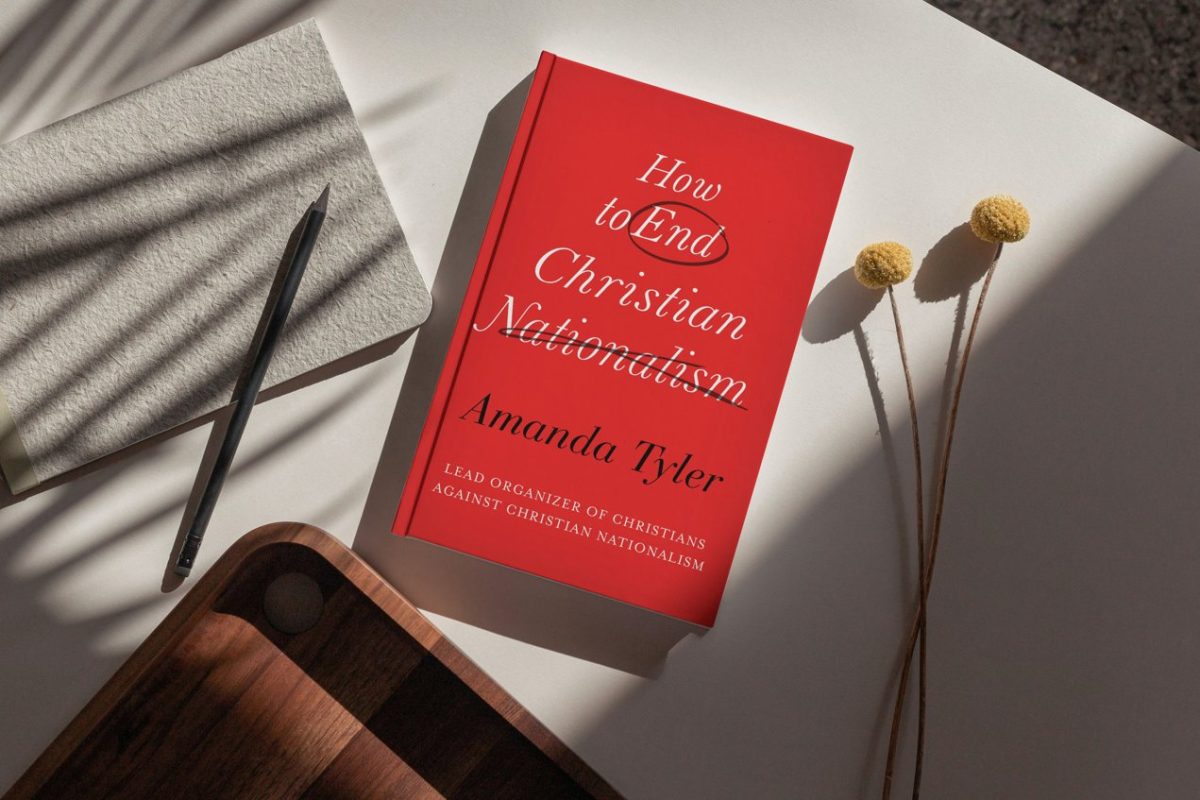

HOW TO END CHRISTIAN NATIONALISM. By Amanda Tyler. Minneapolis, MN: Broadleaf Books, 2024. 244 pages.
Christian Nationalism is not a new phenomenon. Nations and empires have often sought to coopt Christianity for their own purposes. Constantine famously conquered his enemies under the sign of the cross and then embraced Christianity, hoping it would unify his empire (he discovered much to his chagrin that this unifying force was itself divided, leading to him calling the Council of Nicea, but that’s another story). While Constantine didn’t make Christianity the “official” religion of the empire (that was a decision made a few decades later by Theodosius). The point, of course, is that since Constantine, Christianity and empire have sought to coopt each other. While the age of Christendom seems to be waning, Christian Nationalism hasn’t gone away. Because Christian Nationalism is perceived to pose a danger to both the church and the state, numerous books have been published in recent years. I’ve reviewed quite a few of them, and the question that most of these books raise is this: How should Christians respond?

Robert D. Cornwall
Among the authors who have tried to address this question is Amanda Tyler, an attorney and executive director of the Baptist Joint Committee for Religious Liberty. She is also the lead organizer of Christians Against Christian Nationalism. She has written the book How to End Christian Nationalism to provide Christians with a resource that will guide those responding to Christian Nationalism, helping them draw on their values and convictions as they seek to bring an end to nationalistic forms of Christianity. Tyler writes from her experiences as a Christian growing up in Texas Baptist churches. She brings to the topic her background as an attorney and Congressional staffer. She encountered the Baptist Joint Committee for Religious Liberty (BJC) as a college student, serving the organization as an intern, before becoming its executive director. Thus, she writes from her experiences as a Christian (Baptist), lawyer, and political staffer. These experiences formed in her a strong commitment to pursuing religious liberty for all. Since “religious freedom” has become a rallying cry on the part of many conservative Christians, she reminds us that “religious privilege is not religious freedom” (p. 19). With that in mind, Tyler reminds the reader that resistance to Christian Nationalism is not an anti-Christian act. That is because “many Christians are also worried about how Christian faith itself would be cheapened and tamed were it to be blessed by the state” (p. 20).
Amanda Tyler’s How to End Christian Nationalism serves as a call to action while offering guidance about how to take action. She offers the reader eight steps to ending Christian Nationalism, beginning with a chapter on the need to “Name and Understand the Threat of Christian Nationalism” (Chapter 1). In this chapter, Tyler starts with January 6, which she describes as being an expression of Christian Nationalism, which is, she writes, “a political ideology and cultural framework that seeks to fuse American and Christian identities.” The message is that real Americans are Christians and committed to particular political views (p. 26). This ideology is rooted in the myth that the United States was founded as a Christian nation, at least constitutionally.
After she names and defines Christian Nationalism, Tyler moves to step 2, which is “Ground Yourself in God’s Love” (Chapter 2). With Christian Nationalism often expressed in violent imagery, she suggests that Christianity is rooted in God’s love. Thus, it requires that we understand who Jesus was and is. With that in mind, Tyler puts the focus on Jesus’ life and teachings, and their message for contemporary Christians. While not all Christian Nationalists are white, much of the ideology is rooted in white supremacy, which is not rooted in love. The third step in ending Christian Nationalism involves a call for opponents of Christian Nationalism to “Denounce Violence” (Chapter 3). In making this point, she calls on opponents to embrace the nonviolence of Jesus, while opposing the acts of violence that can emerge out of Christian Nationalism.
The next step in this process involves a call to “Commit to the Separation of Church and State” (Chapter 4). This is a central plank in the response, especially since those who embrace Christian Nationalism often deny that the Founders held this idea. It is complicated, but the fact that the only mention of religion in the Constitution is a ban on religious tests should tell us something. Here Tyler offers a strong warning about what happens when the church becomes a tool of the state. She warns against thinking that government support of Christianity will help it flourish. As we’re seeing currently, the polarization within evangelicalism over support for Donald Trump and the MAGA movement has caused great harm to its message. Additionally, there is the reality that the United States is a pluralistic nation and that religious freedom needs to be protected for everyone.
Step 5 serves as a call to “Take On Christian Nationalism Close to Home” (Chapter 5). Here Tyler points to one of the larger Christian Nationalist movements. That movement is known as ReAwaken and is led by Michael Flynn, a retired General and briefly Donald Trump’s first National Security Advisor. Tyler points out how that movement has coopted Christian symbols including baptism for political purposes. Part of the challenge here is distinguishing between patriotism and nationalism. With that in mind, she raises the question of flags in the sanctuary. While she doesn’t call for outright bans on flags in sanctuaries (I would say that a majority of Mainline Protestant congregations have flags in their sanctuaries), she does suggest that congregations have conversations about the place of flags, and suggests perhaps moving flags from the sanctuary, if not completely removing them from churches. She encourages preachers to address Christian Nationalist ideology from the pulpit — that can be tricky because in many Mainline churches that will be seen as meddling in politics.
Tyler’s sixth step involves calling on Christians who resist Christian Nationalism to “Organize for Change” (Chapter 6). In this chapter, Tyler speaks of the importance of engaging in community organizing, especially along multi-racial, multi-ethnic, and multireligious lines. She follows up that chapter with a call to “Protect Religious Freedom in Public Schools.” (Chapter 7). This is an important area of concern because public schools have become the target of Christian Nationalists. We see expressions of this in calls to put up posters of the Ten Commandments in classrooms as well as advocacy for returning prayer to schools, teaching the Bible (efforts are underway to require teaching the Bible in places such as Texas and Oklahoma), along with efforts in several states to replace school counselors with so-called “school chaplains.”
Here again, at stake is religious freedom. Many of these efforts seek to impose on public schools a particular form of conservative Christianity, but what about all the other students? Where is their religious freedom? This is an important issue that needs our attention. She writes that “ending Christian Nationalism in public schools will take a diverse coalition of people, including Christians, who are willing to speak up to say that it is not the government’s job to teach religion or religious texts” (p. 184). I agree with this to a point, though I think it is appropriate to teach world religions in public schools, as long as all are treated equally and respectfully. Unfortunately, this doesn’t always happen.
Step 8 invites the reader who is committed to ending Christian Nationalism to “Take Your Place in the Public Square” (Chapter 8). There is a place for faith in the public square. While the public square is not religiously naked, it must remain a shared space where everyone is welcome to participate. This final step in this process invites us to consider our own role in this process, whether that means running for office or exercising our right to speak on matters of importance. The important thing here is to recognize that faith-based advocacy is not the same thing as Christian Nationalism. We can speak on the important issues of the day, like immigration, from a faith perspective, but it must be done carefully. It’s also important to make it clear that Christian Nationalism does exist even if proponents of Christian Nationalism deny that they are promoting Christian Nationalism. When that happens, we have to return to step 1, which involves defining Christian Nationalism, so we can make sure we understand what we’re talking about!
As I noted earlier in the review, numerous books have been published in recent years that speak to the dangers of Christian Nationalism. Each of these books offers a particular vantage point and message. Amanda Tyler’s How to End Christian Nationalism has a particular purpose in mind. In her book, Tyler seeks to provide resources to Christians who oppose this form of nationalism so they can effectively respond to what is, in many ways a spiritual virus that damages both the church and the state. Tyler offers her response as one who is in the trenches, advocating for religious liberty for everyone, not just Christians, especially not just conservative Christians. As such, How to End Christian Nationalism is a very useful book that can assist Christians who seek to resist this form of nationalism while remaining faithful Christians.
This review originally appeared on BobCornwall.com.
Robert D. Cornwall is an ordained minister in the Christian Church (Disciples of Christ). Now retired from his ministry at Central Woodward Christian Church (Disciples of Christ) of Troy, Michigan, he serves as Minister-at-Large in Troy. He holds a Ph.D. in Historical Theology from Fuller Theological Seminary and is the author of numerous books including his latest “Second Thoughts about the Second Coming: Understanding the End Times, Our Future, and Christian Hope” coauthored with Ronald J. Allen. His blog Ponderings on a Faith Journey can be found at www.bobcornwall.com.






